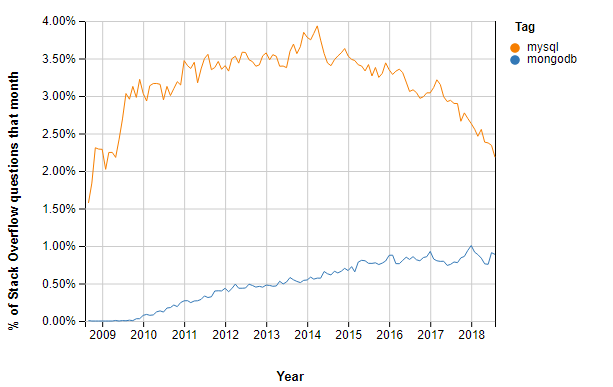Course
SQL Tutorial for Beginners: Learn SQL in 7 Days
SQL Tutorial Summary Databases can be found in almost all software applications. SQL is the...
This tutorial of the difference between SQL and NoSQL databases will discuss key SQL and NoSQL differences. But before discussing NoSQL and SQL difference, let us first look at them individually. Let’s start with SQL:
Structured Query language (SQL) pronounced as "S-Q-L" or sometimes as "See-Quel" is the standard language for dealing with Relational Databases. A relational database defines relationships in the form of tables.
SQL programming can be effectively used to insert, search, update, delete database records.
That doesn't mean SQL cannot do things beyond that. It can do a lot of things including, but not limited to, optimizing and maintenance of databases.
Relational databases like MySQL Database, Oracle, Ms SQL Server, Sybase, etc. use SQL.
NoSQL database stands for "Not Only SQL" or "Not SQL." Though a better term would NoREL NoSQL caught on. Carl Strozz introduced the NoSQL concept in 1998.
Traditional RDBMS uses SQL syntax to store and retrieve data for further insights. Instead, a NoSQL database system encompasses a wide range of database technologies that can store structured, semi-structured, unstructured and polymorphic data.
Next, we will discuss the key diff between SQL and NoSQL.
The below image shows Stackoverflow questions for SQL vs NoSQL databases:

The below image shows the Google trends for NoSQL vs SQL:
NoSQL DB (mongo) Vs RDBMS DB (mysql) Google Trend
SQL Tutorial Summary Databases can be found in almost all software applications. SQL is the...
What is Trigger in PL/SQL? TRIGGERS are stored programs that are fired by Oracle engine...
What is Normalization? Normalization is a database design technique that reduces data redundancy and...
Download PDF 1) What is PL SQL ? PL SQL is a procedural language which has interactive SQL, as well as...
What is the LIMIT keyword? The limit keyword is used to limit the number of rows returned in a...
SQL is the standard language for dealing with Relational Databases. SQL can be used to insert,...